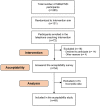Application of the Theoretical Framework of Acceptability to assess a telephone-facilitated health coaching intervention for the prevention and management of type 2 diabetes
- PMID: 36201441
- PMCID: PMC9536591
- DOI: 10.1371/journal.pone.0275576
Application of the Theoretical Framework of Acceptability to assess a telephone-facilitated health coaching intervention for the prevention and management of type 2 diabetes
Abstract
Background: Lifestyle interventions focusing on diet and physical activity for the prevention and management of type 2 diabetes have been found effective. Acceptance of the intervention is crucial. The Theoretical Framework of Acceptability (TFA) developed by Sekhon et al. (2017) describes the multiple facets of acceptance: Affective attitude, burden, perceived effectiveness, ethicality, intervention coherence, opportunity costs and self-efficacy. The aims of this study were to develop and assess the psychometric properties of a measurement scale for acceptance of a telephone-facilitated health coaching intervention, based on the TFA; and to determine the acceptability of the intervention among participants living with diabetes or having a high risk of diabetes in socioeconomically disadvantaged areas in Stockholm.
Methods: This study was nested in the implementation trial SMART2D (Self-management approach and reciprocal learning for type 2 diabetes). The intervention consisted of nine telephone-facilitated health coaching sessions delivered individually over a 6-month period. The acceptability of the intervention was assessed using a questionnaire consisting of 19 Likert scale questions developed using Sekhon's TFA. Exploratory factor analysis (EFA) was performed.
Results: Ratings from 49 participants (19 with type 2 diabetes and 30 at high risk of developing diabetes) in ages 38-65 were analyzed. The EFA on the acceptability scale revealed three factors with acceptable reliabilities: affective attitude (alpha 0.90), coherence and understanding (alpha 0.77), perceived burden (alpha 0.85), explaining 82% of the variance. Positive affect and coherence had high median scores and small variance. Median score for perceived burden was low, but with significant variance due to younger individuals and those at high risk reporting higher burden.
Conclusions: The telephone-facilitated health coaching intervention was perceived as acceptable by the study population using a questionnaire based on Sekhon's TFA, with a wider variation in perceived burden seen among high risk and younger participants.
Conflict of interest statement
Collaborative Care Systems Finland (CCSF) is a social innovation enterprise classified as a small and medium enterprise (SME) partner in the SMART2D Consortium. Similar to other partners in the project, its work was funded by the European Commission Horizon 2020 grant. Apart from this project, CCSF provides services for fee in the form of consultation and training for health care organisations and professionals in implementing behaviour change science into practice in health promotion and disease prevention and self-management support. CCSF as a commercial body had no role in the study design, data collection and analysis, decision to publish, or preparation of the manuscript; it also does not alter our adherence to PLOS ONE policies on sharing data and materials.
Figures
References
-
- World Health Organization, Global report on diabetes. 2016: Geneva.
Publication types
MeSH terms
LinkOut - more resources
Full Text Sources
Medical



